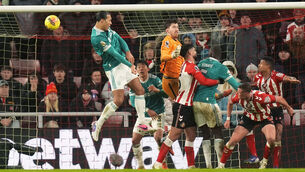Football can help itself — but does it want to?
The Premier League’s sinking ship on the south coast is not alone in its financial difficulties. It owes £60 million (€66.7m), which resulted in it being forced into administration last week, but this week’s Soccerex conference in Manchester heard more about the financial insanity of the Premier League.
For instance, the Premier League accounts for 56% of the total debt of European football. Liverpool owe £237m (€263m) and Manchester United £716m (€797m); wages paid by top-flight Premier League sides in 2007-8, the latest season for which figures are available, grew by 23% from the previous season, to £1.2bn (€1.3bn).














